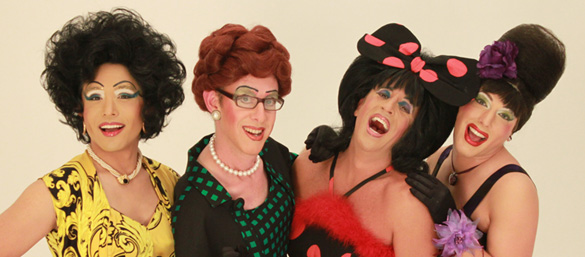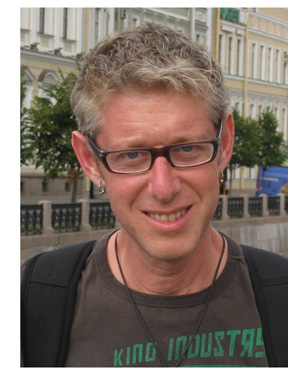| Sun | Mon | Tue | Wed | Thu | Fri | Sat |
|---|---|---|---|---|---|---|
| 1 | 2 | 3 | 4 | 5 | ||
| 6 | 7 | 8 | 9 | 10 | 11 | 12 |
| 13 | 14 | 15 | 16 | 17 | 18 | 19 |
| 20 | 21 | 22 | 23 | 24 | 25 | 26 |
| 27 | 28 | 29 | 30 | 31 |
CATEGORIES
RECENT ENTRIES
BLOG ROLL
He said, she said
Lawyer-turned-drag queen Irwin Keller, JD'88, gave himself a pretty great interview.
By Ruth E. Kott, AM'07

It was the easiest interview ever. After Irwin Keller, JD'88, agreed to an e-mail dialogue about his more than 17 years performing in “America’s Favorite Dragapella Beautyshop Quartet” the Kinsey Sicks, I sent him some questions—"How did you decide on the name Winnie and her character?" "What's your most memorable performance experience?" "Do you think you'll ever go back to being a lawyer?"—but he wasn't really all that excited about them.
Keller took matters into his own hands, coming up with a quite entertaining set of questions and answers. "As I was writing," he said, "I kept modifying questions to elicit the answers I wanted to give, and before I realized it I'd written the whole damn interview. So here is my version for you to do with as you will!"
And we will publish it below.

You probably have one of the more unusual professions for a University of Chicago graduate, wouldn’t you say?
For sure. I do read through the University of Chicago Magazine, and I rarely see anyone having as much fun as I do performing with the Kinsey Sicks. I imagine working on the Chicago Assyrian Dictionary would’ve come close, but at least I’ve still got a job.
How did you end up forming and performing in the Kinsey Sicks?
It was during the early 1990s, when the AIDS epidemic was still raging unchecked and the work was difficult and heartbreaking that we formed the Kinsey Sicks. We were four gay men living in San Francisco, in the center of the storm, and two of us were doing HIV legal work—me locally and Ben Schatz nationally. To blow off steam we’d sometimes do little guerrilla drag outings, getting friends together and showing up somewhere inappropriate in drag.
So in December of 1993 we went to a Bette Midler concert dressed as the Andrews Sisters. A promoter approached us and asked us to do a number at an upcoming World War II-themed event. This was the first time that it dawned on me that all four of us had significant musical background. We were excited by the idea and began harmonizing as we wobbled home on our pumps. We stayed up till 3 a.m. coming up with song ideas, and the Kinsey Sicks were born that night.
How would you describe your act?
Lots of politics, really smart songs, a generous helping of raunch, bad drag, four truly lovable characters, and some really good four-part a cappella singing. It’s very highbrow and very lowbrow at once—the musical styles range from Gaga to opera.
Was it hard to find an audience?
You’d think, wouldn’t you? But no. We almost instantly became a cult hit in San Francisco. We’d write show after show in our evening hours and do four- or six-week runs at a local theater. But then we started touring and imagining what it might be like to do this full time. ... In 2000 we got an offer to open our show Off Broadway, and there was no way I could say no. I didn’t ever want to think that I’d had the opportunity to be a performer at that level and that I said, "No." So I quit my job and haven’t practiced law since.
How did Off Broadway go?
Our first production meeting for the show was September 11, 2001. That probably tells you something right there. We had all moved to New York that week. We already had a contract with Studio 54, which was building an Off Broadway–sized space around us. We had a production crew, designers, everything. We couldn’t just call it off. So we opened the show. It was a great show—the reviews were lavish. But New York was traumatized. No one came. The tourists stayed away. The New Yorkers stayed home. It was heartbreaking. We closed by Christmas, like everything else running Off Broadway at the time, except for Puppetry of the Penis. Go figure.
Sounds like a big disappointment.
Yes and no. It was sad, but it raised our sights. We realized we really could do this for a living. So we started touring full time, and we’ve been doing that now for ten years. We’ve recorded seven albums, starred in two feature films [including Almost Infamous, a behind-the-scenes documentary], and performed in theaters, colleges, and comedy festivals all over the place. Not just the big cities, but small towns and Bible Belt. It’s fun, it’s silly, and it’s often mission-driven. All in all, it’s a life I’d never expected.
Tell us about your character, Winnie.
I love Winnie. She helps me work out a lot of stuff. She’s sort of the den-mother of the Kinsey Sicks and the musical taskmistress. She’s a lesbian but kind of old-fashioned—conservative and prudish. She hates when the group’s smiling veneer begins to crack, and she struggles valiantly to maintain a socially appropriate demeanor. But mostly her attempts fail, often leaving her having to face down the audience in long, awkward silences that have become her comedic stock and trade. I love those long beats.
So how did your time at University of Chicago prepare you for a life with the Kinsey Sicks?
I loved University of Chicago. I loved and still love Hyde Park. My years studying obscure Semitic languages give Winnie no end of puzzling, esoteric factoids to blurt out impulsively on stage.
But most significant is that University of Chicago is where I became an activist. The gay-rights movement was still pretty new; the AIDS epidemic had just started. So I started organizing and protesting and lobbying. I was part of getting the University to adopt its non-discrimination policy. With the support of my law-school professors, I drafted Chicago’s human-rights ordinance, which was passed into law in 1989. I ran the Gay and Lesbian Law Student Association and organized the Chicago Conference on Sexual Orientation and the Law in 1987 (which is actually where I met fellow Kinsey founder Ben Schatz, who was at the time a baby lawyer with National Gay Rights Advocates and one of our invited speakers).
But it was a challenging time. Some readers will remember a horrific spate of anti-gay harassment that went down on campus in 1987—a concerted campaign by a group calling itself the Great White Brotherhood of the Iron Fist. They targeted some dozen visible queer activists on campus, my partner at the time and I among them. They researched us all and sent our parents and neighbors and employers letters telling them that their child or neighbor or employee was gay, and a probable carrier of AIDS, and encouraging violence against us. I became frightened to walk alone at night in Hyde Park, not knowing who these people were and what their actual capabilities might be. The campus community was shocked when it turned out to be a couple of students in the College.
It was terrible. But the experience hardened my resolve. I needed a life where I could be out and outspoken. And for a while, my HIV legal work served that function for me. But frankly, the chance to do social critique in a wig while singing four-part harmony and making people laugh? What could be better than that?
September 27, 2011
